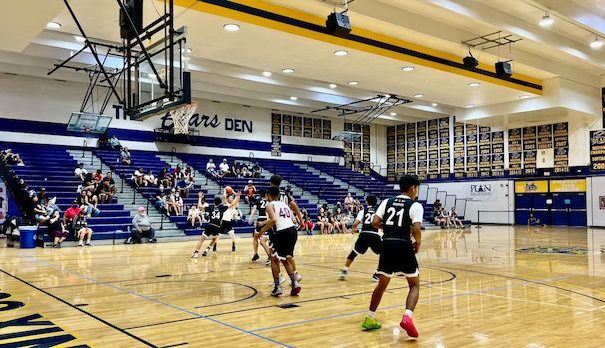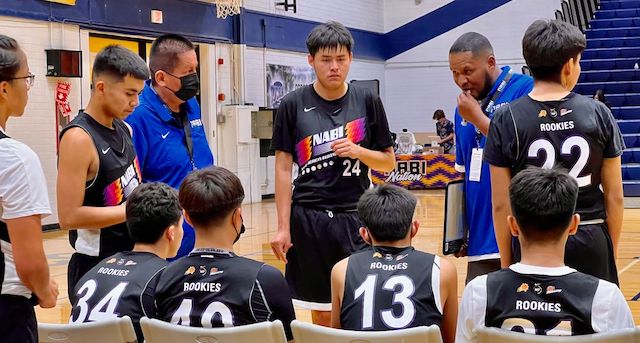News Article Article pages that do not meet specifications for other Trust Project Type of Work labels and also do not fit within the general news category.
Finding talent at the Native American Basketball Invitational
 The Native American Basketball Invitational in Phoenix, Monday, July 18, 2022. (Dalton Walker, ICT)
The Native American Basketball Invitational in Phoenix, Monday, July 18, 2022. (Dalton Walker, ICT)
PHOENIX — In a way, college basketball coach Rob McClain attended one of the premier Native prep basketball tournaments around in search of himself.
McClain, a 6-foot-5 former division 1 guard from the Muscogee Nation, credits the
Native American Basketball Invitational for helping open doors to his stellar college basketball career. McClain is long, slim and quick. In his playing days, when he had the ball in the open court, it likely ended with him soaring in for a slam dunk. Even now, with a coaching clipboard, McClain, 23, still looks the part.
McClain’s return to NABI is full circle, a success story, if you will. It was here in Arizona more than five years ago, then a star at Red Lake High School in northern Minnesota, he connected with Pete Conway, men’s basketball coach at United Tribes Technical College, a junior college, or in the sports world referred to as a juco, in Bismarck, North Dakota.
This week, after two successful playing seasons at United Tribes and two additional seasons at the University of Texas Rio Grande Valley in Edinburg, Texas, McClain was in the stands scouting talent at NABI in his second season as assistant men’s basketball coach at United Tribes.
Now, it’s his turn to find the “next Rob McClain.”
“I’m looking for hard nosed players, players that play to the final buzzer,” McClain said. “I’m a defensive-minded guy so I look for players that have the ability to play beyond juco level defense. I don’t really look for the guy that can score 30, I want a guy who can stop someone from scoring 30. That’s what I look for, players that kind of play the way I did.”
SUPPORT INDIGENOUS JOURNALISM. CONTRIBUTE TODAY.
NABI, in its 19th year, featured dozens of boys’ and girls’ teams representing Native communities from all across the country. Pool play and tournament games were played at 11 gyms throughout the Phoenix metro during the near week-long event. The ultimate prize, of course, is making it to Championship Saturday at the Footprint Center, home of the Phoenix Suns and Phoenix Mercury. Some tournament games were even scheduled on ESPN+.
“NABI is about much more than basketball. NABI unites Native and Indigenous youth and inspires them to become leaders,” NABI CEO GinaMarie Scarpa said in a statement.
NABI is also an opportunity for college coaches to take in all the games and all the Native talent in one place over a matter of days. Coach Taylor Harris said he used that to his advantage. He even took it another level by using his team’s Instagram profile to put coaches on notice that he was in Phoenix and to send him their schedule. Many did.
Harris is in his second year as the women’s basketball coach at Fort Lewis College in Durango, Colorado. His advice for players wanting to play college basketball includes a willingness to learn and better understand the game.
“At the college level, it’s not really about your skill set, it’s about your ability to think the game and understand the right play from the wrong play,” he said. “A red flag for me sometimes is that I hear they don’t watch basketball. Whether it’s the NBA, WNBA or college, watching the best of the best makes you a better player so you can really better understand the game.”

One of his recruits, Lanae Billy, a Navajo from Farmington, New Mexico, is wrapping up her NABI career this summer and Harris wanted to be there to support her.
“Lanae is one of the best high school shooters I’ve seen,” Harris said. “What I love about her, she’s working on the ability to handle the ball. Watching her out here, she’s taking on more of a point guard role, which is really good. She’s working on expanding her game at the college level. You see it here, there’s a lot of athletes that can shoot the ball, but do they want to put that work in to expand their game? That’s what Lanae is doing.”
Harris’ team also includes two other Native players who are heading into their second college season. Both have experience playing at NABI.
“NABI is a great place for me to see potential future women that I can have an impact on,” Harris said.
Shaelene Singer, 17, has a goal to play college basketball. She said she hopes playing at a high level at NABI will help her get noticed. Singer plays for the Zona Soldiers, an intertribal team. She’s Navajo and from Winslow, Arizona.
Singer’s team finished in the top 10 at last year’s NABI. This year, her team went undefeated in pool play.
“There’s a lot of good teams here,” she said. “It’s challenging and competitive. I knew the teams were going to be tough.”
Singer’s coach, Delmar Fuson said NABI is a great opportunity for his players to compete at a high level, showcase their skills and get the experience of playing at “the closest thing to a college environment.”
“Most important for these kids, being able to get as much exposure for the next level as possible,”
Cassius Sundown, Yup’ik, and his 10 Snowbirds teammates were in the running for teams to travel the furthest to Phoenix. Sundown is from Scammon Bay, a small village on the southwest coast of Alaska. He said he took three different planes to get to Arizona. Sundown and his teammates left the 50 degree Alaska temperature for the triple digits of Phoenix.
Sundown competed in NABI last year for the first time and he said that experience motivated him to improve his shooting. He plays point guard, is a big basketball fan and LeBron James is his favorite player to watch.
“Coming to NABI to see where we are in our league and to see where we are compared to these guys,” Sundown said. “We came down specifically for the tournament but we are also enjoying ourselves outside of the tournament.”
Two United Tribes recruits are playing in NABI this summer already. McClain wants to find the next one. He has an eye out for size and taller talent. As an example of the junior college route, McClain’s goal is to sell his program on what one needs to do to reach a high level.
“You get two years to showcase what you weren’t able to do in high school,” McClain said. “For myself, I wasn’t getting looked at by division 2, division 1 scouts. I went to a juco, I balled out my first year, got division 2 looks. Came back my second year, balled out, got division 1 looks. It gave me extra time to get more attention to play at the next level.”
Our stories are worth telling. Our stories are worth sharing. Our stories are worth your support.
Contribute $5 or $10 today to help ICT carry out its critical mission. Sign up for ICT’s free newsletter.
